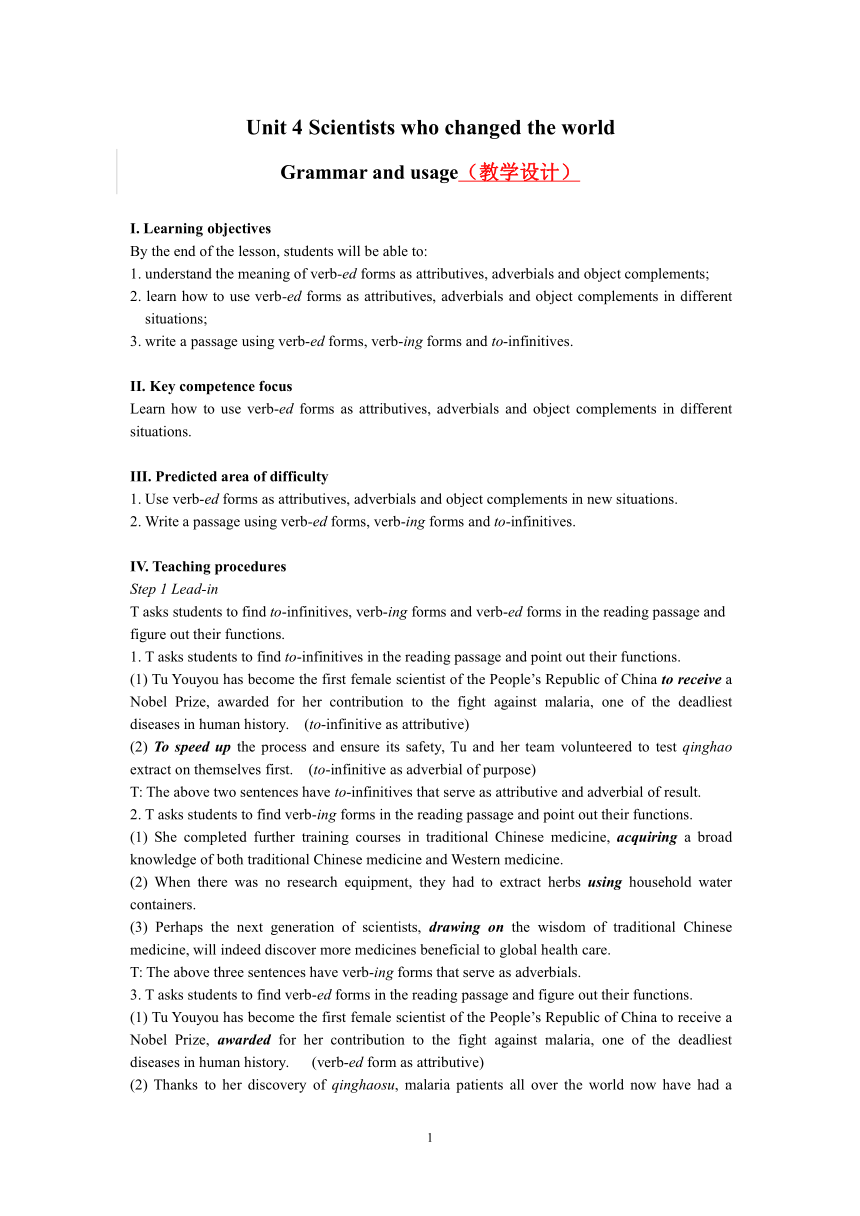
Unit 4 Scientists who changed the world Grammar and usage(教学设计) I. Learning objectives By the end of the lesson, students will be able to: 1. understand the meaning of verb-ed forms as attributives, adverbials and object complements; 2. learn how to use verb-ed forms as attributives, adverbials and object complements in different situations; 3. write a passage using verb-ed forms, verb-ing forms and to-infinitives. II. Key competence focus Learn how to use verb-ed forms as attributives, adverbials and object complements in different situations. III. Predicted area of difficulty 1. Use verb-ed forms as attributives, adverbials and object complements in new situations. 2. Write a passage using verb-ed forms, verb-ing forms and to-infinitives. IV. Teaching procedures Step 1 Lead-in T asks students to find to-infinitives, verb-ing forms and verb-ed forms in the reading passage and figure out their functions. 1. T asks students to find to-infinitives in the reading passage and point out their functions. (1) Tu Youyou has become the first female scientist of the People’s Republic of China to receive a Nobel Prize, awarded for her contribution to the fight against malaria, one of the deadliest diseases in human history. (to-infinitive as attributive) (2) To speed up the process and ensure its safety, Tu and her team volunteered to test qinghao extract on themselves first. (to-infinitive as adverbial of purpose) T: The above two sentences have to-infinitives that serve as attributive and adverbial of result. 2. T asks students to find verb-ing forms in the reading passage and point out their functions. (1) She completed further training courses in traditional Chinese medicine, acquiring a broad knowledge of both traditional Chinese medicine and Western medicine. (2) When there was no research equipment, they had to extract herbs using household water containers. (3) Perhaps the next generation of scientists, drawing on the wisdom of traditional Chinese medicine, will indeed discover more medicines beneficial to global health care. T: The above three sentences have verb-ing forms that serve as adverbials. 3. T asks students to find verb-ed forms in the reading passage and figure out their functions. (1) Tu Youyou has become the first female scientist of the People’s Republic of China to receive a Nobel Prize, awarded for her contribution to the fight against malaria, one of the deadliest diseases in human history. (verb-ed form as attributive) (2) Thanks to her discovery of qinghaosu, malaria patients all over the world now have had a greatly increased chance of survival. (verb-ed form as attributive) (3) Even with large amounts of qinghao extract produced, however, they still faced another problem. (verb-ed form as attributive) (4) Born in 1930, in Ningbo, Zhejiang Province, Tu studied medicine at university in Beijing between 1951 and 1955. (verb-ed form as adverbial) (5) Inspired by an over 1,600-year-old text about preparing qinghao extract wi ... ...
~~ 您好,已阅读到文档的结尾了 ~~